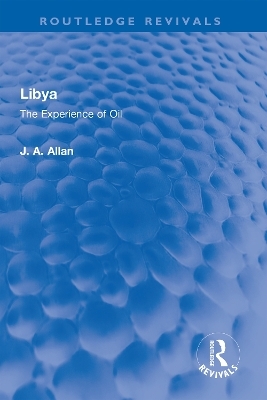
Libya
The Experience of Oil
Seiten
2024
Routledge (Verlag)
978-1-032-32278-0 (ISBN)
Routledge (Verlag)
978-1-032-32278-0 (ISBN)
First published in 1981, Libya: The Experience of Oil provides a comprehensive overview of Libya’ s socio-economic development since the reform of 1961. The book shows that by end of the 1970s there had been a significant redistribution of wealth along with a reorganization of the economy.
First published in 1981, Libya: The Experience of Oil provides a comprehensive overview of Libya’ s socio-economic development since the reform of 1961. It reviews Libya’s oil endowment and draws attention to the deficiencies in the country’s renewable natural resources and in the availability of unskilled labour and trained professional staff. The absorption of oil wealth after 1961 is shown to have been severely constrained by poor factor endowment in land and labour resources. The book shows that by end of the 1970s there had been a significant redistribution of wealth along with a reorganization of the economy, such that almost all production, distribution and resources were under public control. A recurring feature observed in this pattern of change is that rates of investment, sectoral allocations to the development spending, improvement in the standard of living and the level of social service provision advanced at a constant rate after oil and that the revolution had little impact on the rate of improvement in the development indicators. This is book is an essential read for scholars and researchers of African studies, African politics, geopolitics and international relations.
First published in 1981, Libya: The Experience of Oil provides a comprehensive overview of Libya’ s socio-economic development since the reform of 1961. It reviews Libya’s oil endowment and draws attention to the deficiencies in the country’s renewable natural resources and in the availability of unskilled labour and trained professional staff. The absorption of oil wealth after 1961 is shown to have been severely constrained by poor factor endowment in land and labour resources. The book shows that by end of the 1970s there had been a significant redistribution of wealth along with a reorganization of the economy, such that almost all production, distribution and resources were under public control. A recurring feature observed in this pattern of change is that rates of investment, sectoral allocations to the development spending, improvement in the standard of living and the level of social service provision advanced at a constant rate after oil and that the revolution had little impact on the rate of improvement in the development indicators. This is book is an essential read for scholars and researchers of African studies, African politics, geopolitics and international relations.
List of Tables List of Figures Preface and Acknowledgement 1. Libya Before Oil 2. The Impact of Oil 3. Planning and Economic Development Before 1969 4. Benefits and Redistributions of Oil Before 1969 5. Spending and Redistribution of Oil Revenues Before 1969 6. Institutional Change Before the Revolution 7. Planning and Development Since 1969 8. Spending and Distributing Oil Wealth Since 1969 9. Political Change Since 1969 10. The Experience of Development Without Capital Constraints References Index
| Erscheinungsdatum | 22.08.2024 |
|---|---|
| Reihe/Serie | Routledge Revivals |
| Verlagsort | London |
| Sprache | englisch |
| Maße | 156 x 234 mm |
| Gewicht | 562 g |
| Themenwelt | Geschichte ► Teilgebiete der Geschichte ► Kulturgeschichte |
| Sozialwissenschaften | |
| Wirtschaft ► Volkswirtschaftslehre ► Makroökonomie | |
| ISBN-10 | 1-032-32278-0 / 1032322780 |
| ISBN-13 | 978-1-032-32278-0 / 9781032322780 |
| Zustand | Neuware |
| Informationen gemäß Produktsicherheitsverordnung (GPSR) | |
| Haben Sie eine Frage zum Produkt? |
Mehr entdecken
aus dem Bereich
aus dem Bereich
der stille Abschied vom bäuerlichen Leben in Deutschland
Buch | Hardcover (2023)
C.H.Beck (Verlag)
23,00 €
vom Mittelalter bis zur Gegenwart
Buch | Softcover (2024)
C.H.Beck (Verlag)
12,00 €


